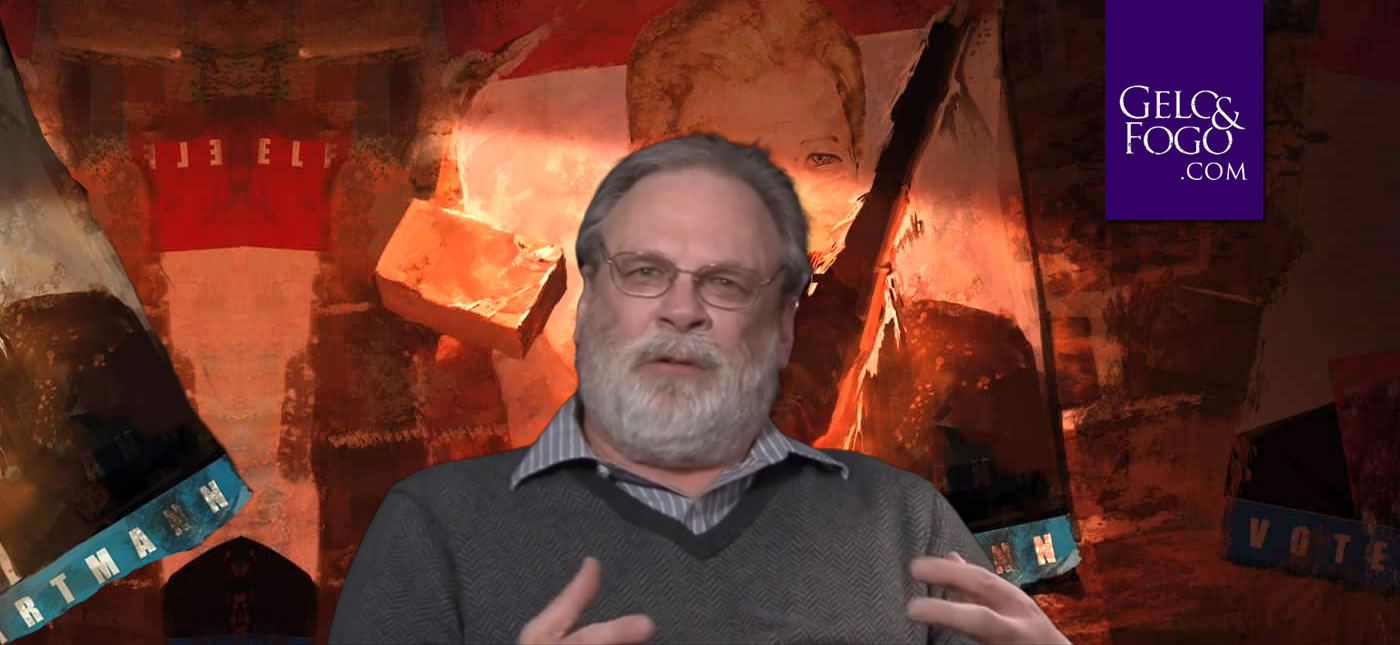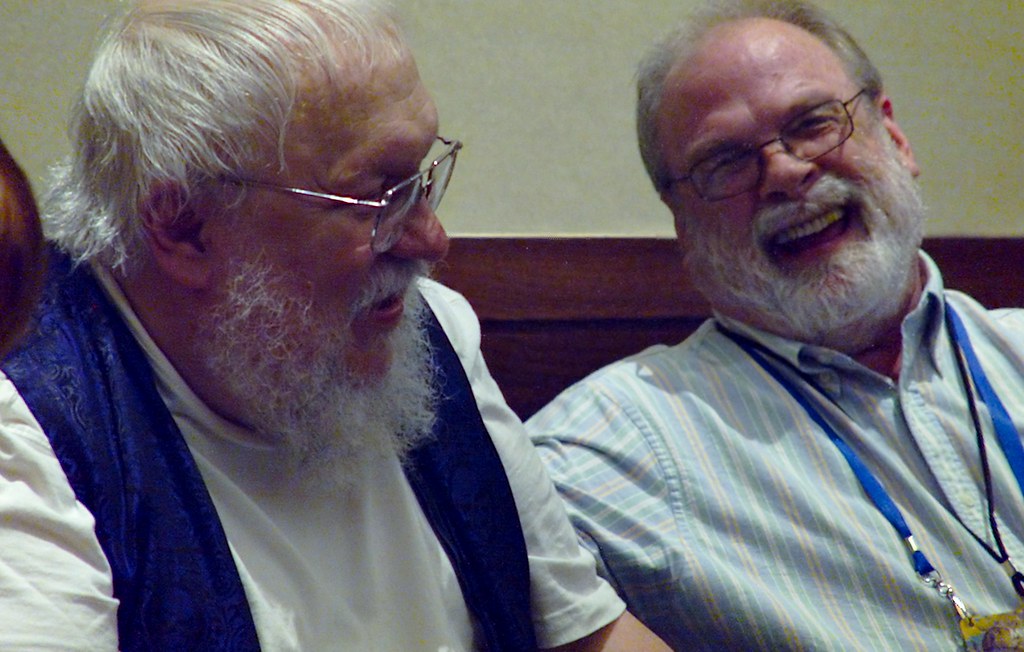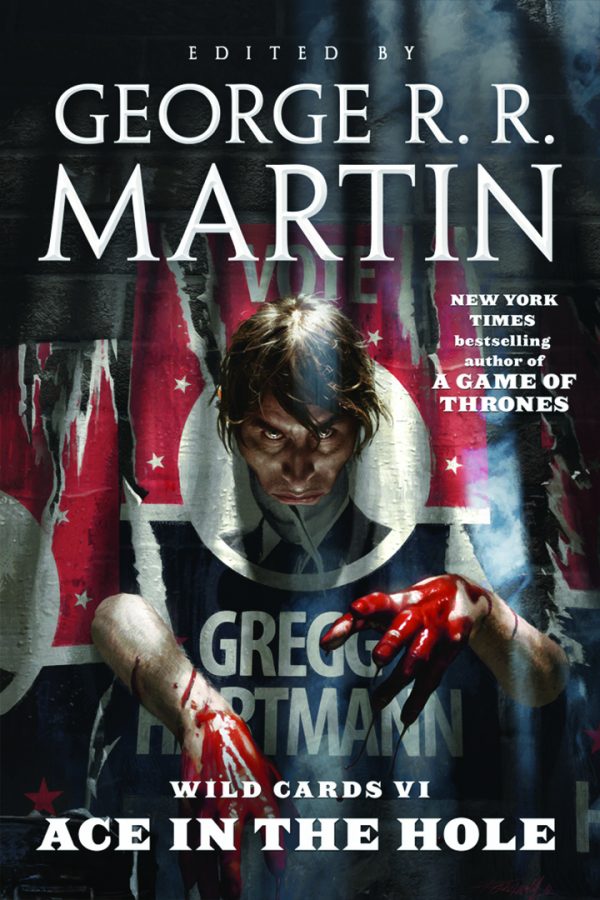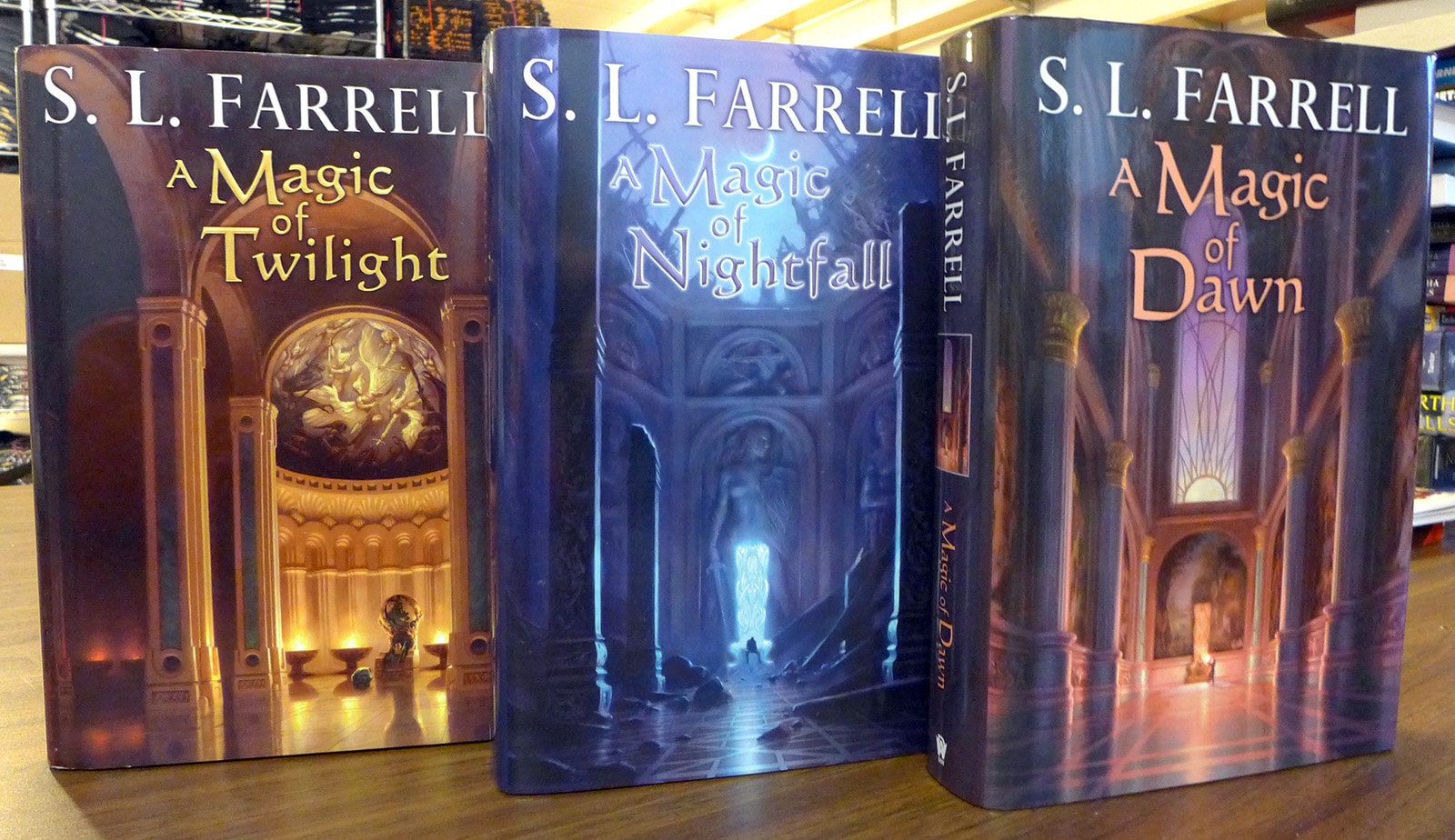
Today the first volume of Wild Cards will be rereleased by publisher Suma in Brazil. Gelo & Fogo decided to use this opportunity to premiere our series of pieces about the shared universe, ran by George R.R. Martin and developed by more than 40 authors.
In “Get to Know Wild Cards Authors“, we’ll chat with several of those authors, talking about their involvement in the series and also presenting their careers as a whole, so that the readers might be encouraged to seek their works.
Our first guest is Stephen Leigh (also known as S. L. Farrell). Stephen is one of the most present authors all long the Wild Cards history, taking part in 15 of the published novels, as well as his solo short fiction available at Tor.com, The Atonement Tango.
His first story on the series was back in the first volume, and his most recent was in the twenty-fourth one, Mississippi Roll. His most famous character is the Puppetman, a villain who takes a central role especially during the quadrilogy named after him, between Aces Abroad and Dead Man’s Hand.
Leigh is also the author of many popular works in the science fiction and fantasy field, the most famous of them being the Nessantico Cycle, a fantasy trilogy set in a Renaissance world. His most recent novel is Rising Moon, part of the Sunpath Cycle. In addition to his writings, he is also a very receptive person, who is in love with literature and gently agreed to talk to us about his works. Check out our interview:
George R. R. Martin e Stephen Leigh
Arthur Maia: How did you first get involved with Wild Cards? What motivated you to accept taking part in it?
Stephen Leigh: You can blame George. My wife Denise and I had become friends with George after meeting him at conventions; we’d visited him; he’d visited us. Then one night (I think it was 1985, but can’t be sure) he called on the phone. The conversation was something like this:
Hey, Steve, you’re a comic book fan, right?
Well, I didn’t know that I could call myself a ‘fan’ of comics, but…
Yeah, I guess. I don’t collect ‘em anymore, but I’ve always read ‘em. Still do, now and then.
You like role-playing games, right?
There, at least, I had a firm answer. For a few years, I’d been running a fantasy RPG that had evolved from D&D but was now using rules of my own devising. “Absolutely.” I wasn’t sure where George was heading with this, but so far I was interested.
Good. I have a proposition for you…
And with that, George went on to tell me about the Superworld RPG he, Melinda Snodgrass, Walter Jon Williams, John J. Miller, Vic Milan, and Gail Gerstner-Miller were playing at the time, how they were spending all their creative energy on the game and how they’d come up with a way to hopefully meld an RPG with their writing careers by turning it into a shared world fiction project—which would, of course, become the WILD CARDS series. He asked if I’d be interested in being part of it, and I told him that I would.
So the original set of writers that George recruited were largely drawn from the Santa Fe/Albuquerque crew, but he also brought in several other writers from ‘outside.’

A.M.: So, let’s talk about your participation in the first book, in which we are presented to three of your most remarkable characters: Gimli, Succubus and Puppetman. How did you come up with them?
S.L.: Puppetman was first. They’d already come up with several characters and George suggested to me that they needed at least one character connected to the politics of this world. Thus was born Senator Gregg Hartmann, aka Puppetman, who would be my main character through the first several books of the series though several others would follow in rapid succession: Gimli, Oddity, the Howler, Succubus, Peanut…
A.M.: What are the peculiarities of writing in a collaborative series such as Wild Cards?
S.L.: One requirement of writing for Wild Cards is that you must show any scenes where you use any person’s character to that person for their approval. In other words, no one can do anything to someone else’s character with the creator’s permission. That lets us avoid ‘revenge’ scenes (“You did something terrible to my character, so I’m doing to do something even worse to yours!”
We’re actively encouraged to use other authors’ characters in our stories.
A.M.: Do you have any favorite characters that other writers created and you could manage to write at some point? And what about some of those you still want to write?
S.L.: I think everyone has enjoyed using Croyd (the Sleeper) in their stories, since Croyd can be whatever you want him to be. Roger was always open to having people use Croyd, and now that Roger’s sadly no longer with us, Croyd continues to be used.
Personally, my own favorite two uses of another person’s character was working with Melinda’s Dr. Tachyon back in the early books when Tachyon and Hartmann were active, and more recently using Ian Tregillis’ character Rustbelt in SUICIDE KINGS as well as in my Drummer Boy story “Atonement Tango” on Tor.com.

A.M.: Later on, the Puppetman got a very important role in the series, did you predicted it when the character made its debut?
S.L.: Not at all, though I was pleased when it happened. Puppetman, in fact, through the ‘original’ fifteen-book run of the series, was the only character whose arc began in Book 1, had a part in nearly all the intervening books, and whose story ended in what we feared might be the last book of the series, BLACK TRUMP. Luckily, the series would undergo a revival later…
A.M.: I couldn’t help but notice the recurrence of the Mississippi River in “In the Shadow of Tall Stacks”, and the cities the Natchez goes through. It reminded me a lot of GRRM’s Fevre Dream but in a 21st-century approach. Whose idea was this setting for Mississippi Roll? Did you do any specific research about the several different cities you would write about?
S.L.: I live in Cincinnati, which is on the Ohio River. In the days of the steamboats, many of the steamboats plying the Ohio and Mississipi had been built in Cincinnati, and Cincinnati has always celebrated its steamboat past. In fact, the “Tall Stacks” festival I mention in the book has actually taken place a couple of times here—and George has come to them to see all the boats that are brought in.
The setting for the book that would become MISSISSIPPI ROLL was set by George when he sent the proposal for a new trilogy to Tor Books—he wanted a book that would be set along the Mississippi. As soon as I saw that proposal, I knew what I wanted to pitch and where I wanted it to end: a story about a steamboat that would end at the Tall Stacks Festival in Cincinnati. I also knew I wanted that story to be the “interstitial” — the story that would flow through and connect all the other stories in the book. I proposed the idea of Steam Wilbur and the ‘haunted’ steamboat Natchez to George, and he loved it.
And yes, I did lots of research on steamboats and the various cities that were used as settings in order to bring it all to life.
A.M.: So, moving on from Wild Cards, let’s talk about different things in your career. The Nessantico Cycle is a great success and has been published in Brazil. Is there anything else to come set in this universe?
S.L.: Not at the moment, I’m afraid, though I still like that universe, so who knows…
A.M.: In the Nessantico Cycle, you deal a lot with the religious aspect of fantasy and also contrast it with some early scientific practices. How do you see the position of this discussion nowadays, and what moved you to write a fantasy series that gravitates around it?
S.L.: I’ve always been interested in exploring the clash of different cultures, and the setting of a faux Renaissance allowed me to play with an intersection where science was clashing with a more mystical, magical worldview. I think that’s something that’s still relevant today. Certainly you see that in the largely Latin genre termed ‘magic realism’.

A.M.: What other of your works would you like to see translated into Portuguese?
S.L.: Any or all of them! Though I’d love to see IMMORTAL MUSE published in Portuguese – that’s still one of my personal favorites of the books I’ve written.
A.M.: And what comes next for you? Are you currently writing anything you could tell us about?
I’ve just finished a science fiction novel entitled AMID THE CROWD OF STARS which should be coming out from DAW Books sometime in 2020. And I have a piece of short fiction I have to write before the end of the year for the original anthology titled MY BATTERY IS LOW AND IT IS GETTING DARK, to be published by ZNB, LLC and edited by Joshua Palmetier and Crystal Sarakas. Hopefully, I’ll be pitching something to George for Wild Cards in the near future. And I’m starting to put together a proposal for my next novel.
The writing (hopefully) never stops!
Wild Cards: O Começo is the Brazilian re-release of Wild Cards #1, with stories by Stephen Leigh, Walter Jon Williams, Melinda Snodgrass, Howard Waldrop, Roger Zelazny, Victor Milán e George R.R. Martin and others. It’s available on Amazon.
The Puppetmaster quadrilogy comprises books Aces Abroad, Down and Dirty, Ace in the Hole and Dead Man’s Hand.
